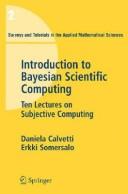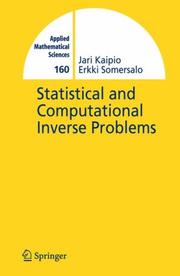| Listing 1 - 2 of 2 |
Sort by
|

ISBN: 0387733949 0387733930 Year: 2007 Publisher: New York, NY : Springer New York : Imprint: Springer,
Abstract | Keywords | Export | Availability | Bookmark
 Loading...
Loading...Choose an application
- Reference Manager
- EndNote
- RefWorks (Direct export to RefWorks)
A combination of the concepts subjective – or Bayesian – statistics and scientific computing, the book provides an integrated view across numerical linear algebra and computational statistics. Inverse problems act as the bridge between these two fields where the goal is to estimate an unknown parameter that is not directly observable by using measured data and a mathematical model linking the observed and the unknown. Inverse problems are closely related to statistical inference problems, where the observations are used to infer on an underlying probability distribution. This connection between statistical inference and inverse problems is a central topic of the book. Inverse problems are typically ill-posed: small uncertainties in data may propagate in huge uncertainties in the estimates of the unknowns. To cope with such problems, efficient regularization techniques are developed in the framework of numerical analysis. The counterpart of regularization in the framework of statistical inference is the use prior information. This observation opens the door to a fruitful interplay between statistics and numerical analysis: the statistical framework provides a rich source of methods that can be used to improve the quality of solutions in numerical analysis, and vice versa, the efficient numerical methods bring computational efficiency to the statistical inference problems. This book is intended as an easily accessible reader for those who need numerical and statistical methods in applied sciences. .
Bayesian statistical decision theory. --- Inverse problems (Differential equations) --- Mathematical statistics. --- Mathematics --- Statistical inference --- Statistics, Mathematical --- Statistics --- Probabilities --- Sampling (Statistics) --- Differential equations --- Bayes' solution --- Bayesian analysis --- Statistical decision --- Statistical methods --- Information theory. --- Computer science. --- Computer science --- Distribution (Probability theory. --- Theory of Computation. --- Computational Science and Engineering. --- Statistics and Computing/Statistics Programs. --- Computational Mathematics and Numerical Analysis. --- Probability Theory and Stochastic Processes. --- Mathematics. --- Distribution functions --- Frequency distribution --- Characteristic functions --- Computer mathematics --- Discrete mathematics --- Electronic data processing --- Informatics --- Science --- Communication theory --- Communication --- Cybernetics --- Computers. --- Computer mathematics. --- Statistics . --- Probabilities. --- Statistical analysis --- Statistical data --- Statistical science --- Econometrics --- Probability --- Combinations --- Chance --- Least squares --- Mathematical statistics --- Risk --- Automatic computers --- Automatic data processors --- Computer hardware --- Computing machines (Computers) --- Electronic brains --- Electronic calculating-machines --- Electronic computers --- Hardware, Computer --- Computer systems --- Machine theory --- Calculators --- Cyberspace

ISBN: 0387220739 1441919643 9786610263127 1280263121 0387271325 9780387220734 Year: 2005 Volume: 160 Publisher: New York, NY : Springer New York : Imprint: Springer,
Abstract | Keywords | Export | Availability | Bookmark
 Loading...
Loading...Choose an application
- Reference Manager
- EndNote
- RefWorks (Direct export to RefWorks)
The book develops the statistical approach to inverse problems with an emphasis on modeling and computations. The framework is the Bayesian paradigm, where all variables are modeled as random variables, the randomness reflecting the degree of belief of their values, and the solution of the inverse problem is expressed in terms of probability densities. The book discusses in detail the construction of prior models, the measurement noise modeling and Bayesian estimation. Markov Chain Monte Carlo-methods as well as optimization methods are employed to explore the probability distributions. The results and techniques are clarified with classroom examples that are often non-trivial but easy to follow. Besides the simple examples, the book contains previously unpublished research material, where the statistical approach is developed further to treat such problems as discretization errors, and statistical model reduction. Furthermore, the techniques are then applied to a number of real world applications such as limited angle tomography, image deblurring, electrical impedance tomography and biomagnetic inverse problems. The book is intended to researchers and advanced students in applied mathematics, computational physics and engineering. The first part of the book can be used as a text book on advanced inverse problems courses. The authors Jari Kaipio and Erkki Somersalo are Professors in the Applied Physics Department of the University of Kuopio, Finland and the Mathematics Department at the Helsinki University of Technology, Finland, respectively.
Inverse problems (Differential equations) --- Problèmes inversés (Equations différentielles) --- Numerical solutions. --- Solutions numériques --- Inverse problems (Differential equations) -- Numerical solutions. --- Mathematics - General --- Mathematical Theory --- Calculus --- Mathematics --- Physical Sciences & Mathematics --- Numerical solutions --- Inverse problems (Differential equations). --- Problèmes inversés (Equations différentielles) --- Solutions numériques --- EPUB-LIV-FT LIVMATHE SPRINGER-B --- Mathematics. --- Mathematical analysis. --- Analysis (Mathematics). --- Computer mathematics. --- Probabilities. --- Physics. --- Complexity, Computational. --- Biomedical engineering. --- Probability Theory and Stochastic Processes. --- Analysis. --- Computational Mathematics and Numerical Analysis. --- Theoretical, Mathematical and Computational Physics. --- Complexity. --- Biomedical Engineering. --- Clinical engineering --- Medical engineering --- Bioengineering --- Biophysics --- Engineering --- Medicine --- Complexity, Computational --- Electronic data processing --- Machine theory --- Natural philosophy --- Philosophy, Natural --- Physical sciences --- Dynamics --- Probability --- Statistical inference --- Combinations --- Chance --- Least squares --- Mathematical statistics --- Risk --- Computer mathematics --- Discrete mathematics --- 517.1 Mathematical analysis --- Mathematical analysis --- Math --- Science --- Numerical analysis --- Differential equations --- Distribution (Probability theory. --- Global analysis (Mathematics). --- Computer science --- Engineering. --- Biomedical Engineering and Bioengineering. --- Construction --- Industrial arts --- Technology --- Analysis, Global (Mathematics) --- Differential topology --- Functions of complex variables --- Geometry, Algebraic --- Distribution functions --- Frequency distribution --- Characteristic functions --- Probabilities --- Mathematical physics. --- Computational complexity. --- Physical mathematics --- Physics --- Inverse problems (Differential equations) - Numerical solutions.
| Listing 1 - 2 of 2 |
Sort by
|

 Search
Search Feedback
Feedback About
About Help
Help News
News